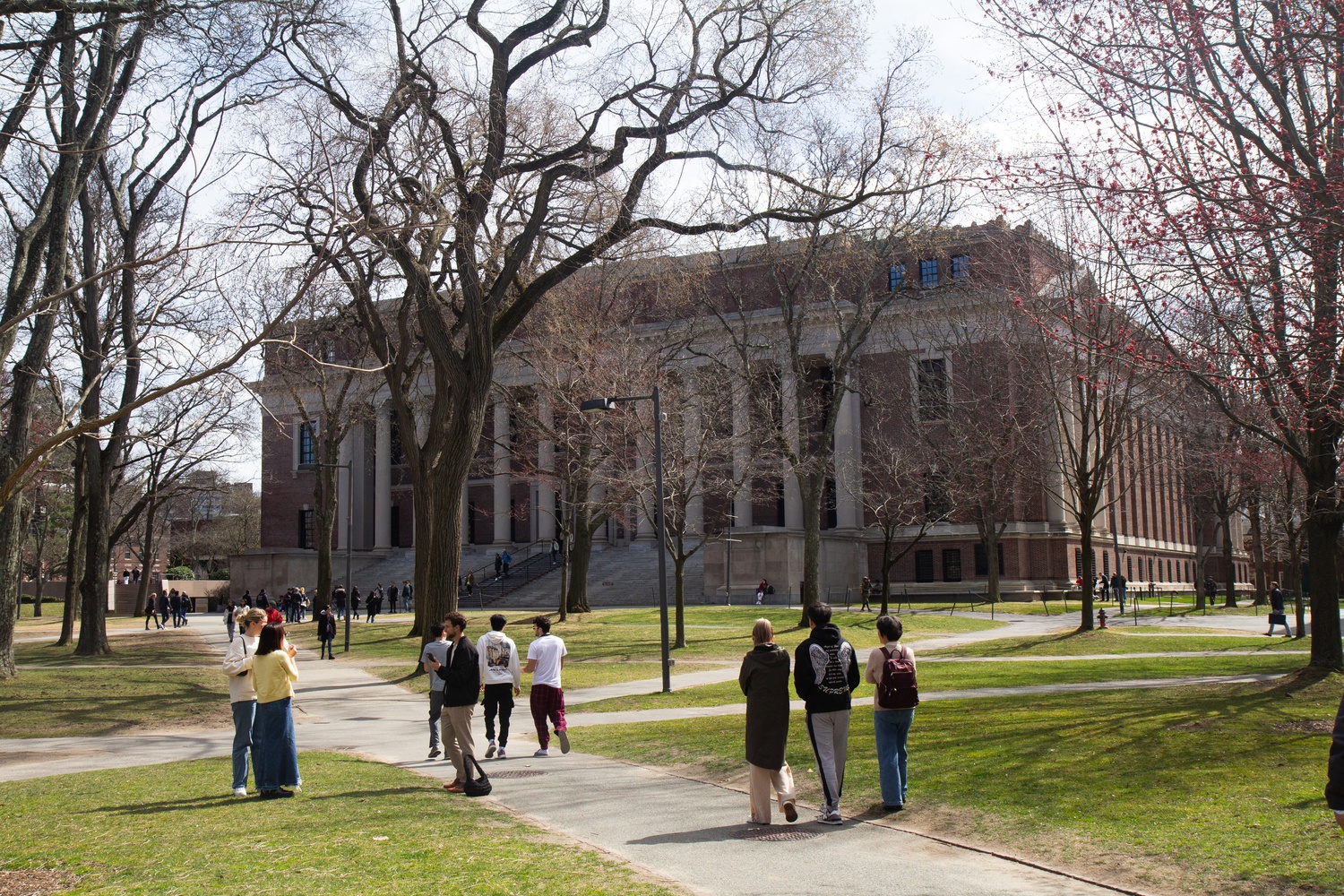
News
Faculty of Arts and Sciences Lacks Confidence in Harvard’s Governing Boards, Per Survey

News
Jeremy Weinstein Will Serve as Next Harvard Kennedy School Dean, Garber Confirms

News
More Than 30 Students to Appear Before Harvard College Ad Board for Pro-Palestine Yard Encampment

News
As Students Occupy Harvard Yard, Faculty Urge Against Police Response

News
ACLU Calls on University Presidents to Protect Protests, Free Speech in Open Letter
Harvard Students Form Academic Freedom Group Amid Debates Over Speech, Neutrality

Roughly a year after more than 70 Harvard faculty members formed the Council on Academic Freedom, some Harvard undergraduates have decided to follow their lead.
Three students — Theodore W. Tobel ’27, Luka Pavikjevikj ’27, and Lorenzo Z. Ruiz ’27 — announced the formation of Harvard Undergraduates for Academic Freedom on Thursday. The group will explore issues related to free inquiry, intellectual diversity, and civil discourse at the College, working parallel to CAFH.
The group’s formation comes at a time when faculty and students alike have increasingly voiced concerns about free speech and the quality of discourse on campus. Those concerns escalated last semester as Harvard came under fire for its handling of antisemitism on campus, with some affiliates — including interim Harvard President Alan M. Garber ’76 — suggesting that pro-Palestine activism has created an atmosphere of self-censorship.
The House Committee on Education and the Workforce’s investigation into antisemitism at Harvard has also precipitated fears that the University’s independence could be threatened, as Republican elected officials have subpoenaed Harvard leadership and grilled former President Claudine Gay about courses taught in Harvard classrooms.
According to the HUAF’s official announcement on Thursday, the group’s guiding values are institutional neutrality, nonviolence and respectful dialogue, academic freedom and free speech, and intellectual diversity.
“I think that what we’ve seen over the course of the last five or six months is when the institution decides that it needs to interject its own opinion as a University into complicated external political and social issues, it curtails the freedom of our student body and our faculty to render insight and reach conclusions on their own,” Ruiz, a Crimson Editorial editor, said in an interview.
On Thursday, Garber announced the formation of two groups to consider open inquiry and a policy of institutional neutrality, a month after The Crimson reported that faculty and top administrators alike were warming to the idea that Harvard should stay silent on contentious political issues.
The HUAF calls for the adoption of a University-wide statement on institutional neutrality and clarified guidelines regarding time, place, and manner limits on speech in the Faculty of Arts and Sciences Free Speech Guidelines.
The group also requests the protection of academic freedom of students through the elimination of “consideration of students’ politics or ideologies in grading” and the promotion of intellectual diversity inside and outside the classroom.
Tobel said that disruptive protests in classroom spaces also undermine the academic experience.
“The interior of all buildings, by virtue of their academic purpose, should be off limits from demonstrations and protests. But I would like to emphasize that we believe that it is very important for students to disagree, and we would like Harvard to become kind of a bastion for free and civil exchange,” he added.
The group’s genesis came when Tobel penned an open letter on Medium to the Harvard Corporation, the University’s highest governing body, titled “An Appeal for Academic Freedom” over winter break.
After seeing and reposting the piece, Steven A. Pinker, Harvard psychology professor and a co-president of the Council on Academic Freedom, put Tobel in touch with Pavikjevikj, a Crimson News editor and another freshman interested in starting a student group dedicated to promoting academic freedom.
Ruiz said that he was approached by Tobel and Pavikjevikj because of his column in The Crimson focusing on issues like institutional neutrality, intellectual diversity, and academic freedom at Harvard.
“And since then, we’ve been meeting weekly — usually over J.P. Licks hot chocolate — to discuss how Harvard Undergraduates for Academic Freedom, or HUAF, can dedicate itself to this elevation of a wide range of peer voices,” Tobel said.
Ruiz said that he and other members of HUAF appreciate the support they have received from Pinker and are looking forward to a working relationship with CAFH.
“It’s important for students to understand that we’re really a channel for their voice, not a channel for the voice of professors and faculty,” Ruiz added.
History lecturer Flynn J. Cratty, the executive director of CAFH, wrote in an email Thursday that HUAF will act as an independent student organization — not an auxiliary of the faculty group.
“We are of course delighted to see students engaging in this work and will try to support them in any way we can,” Cratty wrote.
The Council on Academic Freedom launched last March with faculty members representing an array of academic fields and departments. According to the Council’s website, there are now more than 170 faculty members in the group.
HUAF will hold its inaugural event next Wednesday with a screening of The Coddling of the American Mind, based on the book by Greg Lukianoff and Jonathan Haidt. The screening is open to the public.
Ruiz said that he wants HUAF to be a non-partisan environment to facilitate “broad-based support” for institutional neutrality, free exchange, and free expression.
“I do not want academic freedom to be claimed by the ideological right — this is a cause that we can all champion, progressive and beyond,” Ruiz said.
“This is about enabling everyone to come to the table,” he added.
—Staff writer Michelle N. Amponsah can be reached at michelle.amponsah@thecrimson.com. Follow her on X at @mnamponsah.
Want to keep up with breaking news? Subscribe to our email newsletter.
